Phoresis Read online
Page 5
As noon approached, they were still only halfway down the stairs. They stopped to rest, waiting out the darkness as the sun disappeared behind Tvíburi. Against the backdrop of stars, the black disk of their twin softened to a bluish gray, lit by the half of their own world that was not yet in shadow, glowing in the Tvíburian midnight sky.
When they reached the ground, Erna was waiting for them.
“There’s been a fall,” she said.
Freya nodded grimly, sickened but unsurprised. She’d heard that some of the younger workers had stopped using safety ropes on the stairs, and apparently all her warnings had come to nothing; some people were just too impatient to care. “Who is it? Is she in the medical tent?” Freya started walking toward the tent, trying to control her anger. Reprimands could wait; the poor woman would be suffering enough from her bruises.
“It’s Sonja,” Erna replied, hurrying after her. “They’ve taken her to the tent, but…”
“But what?”
“She’s dead, Freya.”
Freya stopped. “How can she be dead?” No one had mentioned any accidents before she ascended that morning for the inspection. “How long were they treating her?”
“She died when she hit the ground. She fell straight down, from the very top.”
“Not down the stairs? She fell from a platform?”
Gro had caught up with them. “How?”
Erna said, “I don’t know. You’ll need to talk to the people who were up there with her. But we’re still waiting for them to arrive.”
The body lay on a stretcher on the floor of the medical tent, covered by a tarpaulin. Freya lifted one corner, then replaced it.
“Do you know if her mother’s still alive?” she asked Gro.
“She is.”
“I’ll need to go to the village and tell her.”
“Of course,” Gro replied. “But I think you should wait until we have some idea what happened.”
Freya covered her eyes with her forearm. Maybe it had just been a matter of time, but they’d come a long way without a single death. She’d always imagined that if it did happen, it would be part of a calamity that ended the whole project—some miscalculation that saw a whole column of ice snap at the base and crash to the ground. And though she could see why some people resented the encumbrance of the safety ropes on the stairs—where a tumble would be brutal but might well be survivable—surely everyone’s natural instincts compelled them to take infinitely more care around the edges of the platforms.
She turned to Erna. “Which tripod was it?”
“The northernmost.”
“When should the witnesses be down?”
“Soon.”
“I’m going to go wait for them.”
The three of them trudged over the ice, huddled against the biting wind. Maybe the whole thing had been the purest kind of accident, with a gust of wind knocking Sonja off the platform as she switched her second safety rope to a new anchor, and by chance the first one frayed, or its point of attachment came loose. The air was thinner up there, but the wind was faster; it could take you by surprise.
“Which leg?” Freya asked, as they approached the northern tripod.
“I’m not sure,” Erna admitted.
Freya’s anger returned; every ascent was supposed to be logged in detail. “Do we even know who was up there with her?”
“Lofn, Juliet, and…your niece.”
Gersemi. Freya felt a pang of shame, as if this compounded her own culpability. But she had never been softer on Gersemi than she had on anyone else. And apparently it made no difference anyway; they all ignored her pleas to take the protocols seriously.
When they reached the nearest leg of the tripod, Freya peered up along the staircase, but she couldn’t see anyone descending. She wasn’t going to run back and forth between the three legs, waiting for someone to come into view; she sat down on the staircase and motioned to the others to join her. At least here they were sheltered a little from the wind.
Gro said, “They must have been fitting the last sets of double doors.”
That made sense, but Freya still wondered about the timing. “Then they were well ahead of schedule.” She and Gro had only just started their inspections; it would be days before they reached this tripod. And in any case, she never put pressure on anyone to rush their work. It was the ice that set the pace in the end; they wouldn’t get to Tvíburi a day sooner by hurrying some bit of carpentry.
Freya heard footsteps from above. She turned and looked up, then rose to her feet and walked away to get a better view, but she could still only see one person descending—bounding down the stairs with the kind of urgency that made Freya wonder bitterly if this woman thought there was still a chance that she could help her friend.
“I think that’s Lofn,” Erna said.
“So where are the others?” Gro asked.
Freya almost replied, Taking their time and using the ropes, because they’ve finally learned their lesson. But she had to get her anger under control; it was no more helpful now than Lofn’s haste.
Lofn slowed as she approached the ground, but Freya waited for her to step onto the ice before speaking.
“You must be in shock,” she said. “You understand that Sonja’s dead?”
“Yes.” Lofn couldn’t look her in the eye.
“Is anyone else hurt?” Freya asked, as gently as she could.
“I don’t think so. They’re coming down the other way.” Lofn gestured to the north, toward another of the tripod’s legs.
Freya was surprised. “You weren’t all together up there?”
“Two of us were, at the start,” Lofn replied, staring at the ground. “Then we started crossing over.”
“Crossing over?” Freya’s puzzlement didn’t last long: there was really only one thing the words could mean. “And that’s how Sonja fell? Crossing over?”
“Yes.”
Freya stepped forward and embraced Lofn, as much to control herself as to try to comfort the woman. Screaming questions at her while she was standing in the wind, shivering with grief, would be unspeakably cruel.
Juliet and Gersemi approached. Gro walked over and met them, speaking with them quietly. Juliet started sobbing.
Freya was tired. “Let’s get out of the wind,” she said.
In the evening, the whole crew assembled in the dining tent to remember Sonja. Freya hadn’t known her well, but she clutched at every anecdote and every kind word, trying to prepare herself to meet the woman’s mother. She helped her friend Carla through her illness. She found a way to make the worst of the vegetables the farmers sent us almost palatable. Freya wasn’t going to traipse into the woman’s village, pushing the corpse ahead of her on a cart, only to blather on about Sonja’s noble sacrifice that had brought them all closer to Tvíburi.
She waited until the morning to take Sonja’s three colleagues aside. She sat them down in the planning tent, with a pile of work logs by her side.
“How long has this been happening?” she asked.
“About thirty days,” Gersemi replied.
“So talk me through it. You throw ropes…?”
“Yes,” Gersemi confirmed. “One person goes to the top of each leg of the tripod, and we throw ropes between the platforms to join them all up. Once they’re secured, we can cross over.”
“Along the ropes. Hand over hand?”
“Yes.”
Freya said, “How could you imagine for a moment that that would be safe?”
Lofn said, “You want us to spend our whole lives reaching for Tvíburi—and at the same time, you want us to be so timid that we can’t even cross fifty strides on a rope?”
Freya understood what she was saying, but the answer still didn’t satisfy her. “There are risks that we won’t be able to avoid. But this wasn’t one of them. You should save your courage for the times when it’s needed.”
“And you should do the same with your rules,” Gersemi replied.
Freya was stung. “Are you saying this is my fault? For asking you to protect yourselves on the stairs?”
“No.” Gersemi was abashed, but she added, “No one’s happy wasting their time on the stairs—and the safety ropes made that seem even more foolish. But I’m not making excuses for what happened to Sonja. If we wanted this, we should have done it openly. We rushed things, we cut corners, to keep the supervisors from finding out. That was our fault, and no one else’s.”
Freya sent them away and went to prepare the body. She bandaged the broken limbs as best she could, trying to bind them into some semblance of the natural shape that the woman’s shattered bones were no longer able to impose.
As she wound the fabric around Sonja’s leg, her forearm brushed against the dead woman’s abdomen, and she felt it twitch. She dropped the bandage and stepped away, wondering if she should run and fetch the medic. But that was insane; Hanna would never have stopped treating Sonja if there’d been any chance that she was still alive.
Freya approached the body and spread her hand over the place she’d inadvertently touched. The flesh was cold and yielding; even a person who’d lost consciousness and gone days without breathing would not be like this. But after a moment, she felt the movement again. The muscles of the abdomen itself weren’t contracting; rather, something was pushing against them. Sonja had not survived, but one of her brothers was clinging to life.
“Hanna!” Freya shouted. She wasn’t sure where her friend was, but she was usually close to the tent. “Hanna!”
Hanna came running, then stopped, confused. “What is it?”
Freya explained. “That’s impossible,” Hanna declared. “I palpated and listened, five or six times.” But she walked up to the body, and Freya stepped aside.
Hanna dug her fingers into Sonja’s belly, and Freya saw her start in surprise. “I don’t know how I missed it. Do you know anyone who could…?”
“I’ll do it,” Freya replied. One of her brothers had died a while ago, and the remaining pair had grown docile with age. They were sure to resent the newcomer, but they wouldn’t have the strength to kill him.
“Are you sure?”
The only thing Freya was sure of was that she owed this to the family. She said, “We don’t have time to look for someone else.”
Hanna fetched a scalpel. Freya couldn’t watch; she sat on one of the beds, facing away, trying not to interpret the sounds she was hearing.
After a while, Hanna said, “I’m sorry. He was too badly injured.”
Freya was numb. “I can’t take her back to the village like that.”
“I know. I’ll stitch her up.”
Freya cradled her head in her hands and listened to Hanna moving around the tent, fetching what she’d need.
Hanna said, “Did you know she was using a pessary?”
“No.”
“That’s why I missed the signs: there weren’t any.”
“Well, no one wants to have children out here.” The herbs were meant to render a woman’s brothers quieter, but Freya had never felt the need to take such intrusive measures herself. She was about to ask why the pessary had suddenly stopped working and let the surviving brother wake, but then decided that she really didn’t want to hear a detailed account of post mortem changes in the womb.
“She didn’t get it from me,” Hanna said. “And it looks stronger than anything I would have supplied. A dose that high risks losing your chance to have nieces.”
“Why would anyone do that?” Freya turned to face her; thankfully, Hanna’s task was almost finished.
“When your brothers fall into the deepest sleep,” Hanna explained, “it’s easier to do certain things. Working at heights, for example.”
Freya was confused. “Why? You mean some women lose their balance if there’s a brawl?”
Hanna laughed curtly. “Not that I’ve heard. It’s subtler than that. You know they share our blood supply? Just as an unborn child does.”
“Yes.”
“Well, they don’t just take from it, they put back as well. And what they feed us can make us more cautious…or at least, that’s the case when they’re fully alert.”
Freya had heard something like that when she was a child, but she’d thought it was just a folk superstition.
“Are you serious?”
“I’ve seen the difference it makes,” Hanna insisted.
“But why would it work like that?”
“If your survival depended entirely on your sister’s, wouldn’t you want to do everything you could to discourage her from killing you both?”
Freya said, “Yes—but I expect she’d already be quite keen on staying alive herself.”
“Of course.” Hanna looped the needle through one last time, made a knot, then cut the thread. “But she’d also be capable of taking into account considerations to which her brothers were entirely oblivious. Do any of our brothers know what’s happened with the geysers? Why we’re building the tower? What’s at stake here?”
“So you think some of the women have started silencing their brothers’ qualms? They know that what we’re doing is worth the risk—and they want that to be enough to keep them going.”
“I think they want a fairer fight,” Hanna replied. “They want to conquer their own fears, one against one—instead of four against one, with three adversaries who can’t be reasoned with at all.”
Freya went to find Gro, to tell her that she was leaving for the village.
“Have you decided on a punishment?” Gro asked.
“I’m not going to punish them,” Freya replied. “They know what they did wrong. Now we need to find a way to make it safe.”
Gro was bemused. “The tripods will meet up soon, and the temptation will be gone. Why not banish anyone who tries the same stunt again, and leave it at that?”
Freya said, “The first level of tripods will meet up soon, but what about the next one? And the next? Do you think people will climb up and down all those stairs, just because we asked them to, long after we’re dead?”
“Maybe not,” Gro conceded.
“This thing isn’t ours anymore.” Freya laughed. “If it ever was. All we can leave behind is what we’ve learned: about the strength of ice, about the way the roots grow, about gravity, torques and forces. The rest is in other people’s hands, and the ones who’ll matter most haven’t even been born yet.”
She returned to the medical tent with a cart, then set off across the ice.
5
Leander was not the brightest star in the sky, but it was the brightest that ever crossed behind Tvíburi. Rosalind set up the telescope to track it, lit a lamp and prepared the comparator.
She had chosen a night when the timing would be as close to perfect as the various celestial constraints allowed. Leander needed to approach Tvíburi’s dark side, which meant the occultation had to take place well before midnight, when the sunlit portion of the twin was still skewed to the west. But then it was a question of balancing that requirement with the need to ensure that the sky was equally dark for both measurements: the one just before the occultation, and the one just before Leander set. Some of her friends had argued that it wasn’t strictly necessary to do both on the same night, but Rosalind found the idea of a prolonged delay troubling. She was confident that she could trim and fuel a lamp in such a way that it would give out constant illumination from dusk to dawn, but keeping it burning longer, let alone extinguishing and reigniting it, would be inviting inconsistency. If she ended up dead, it wasn’t going to be for a foolish reason like that.
Well before the occultation, she stopped down the light from the lamp and adjusted the comparator’s iris until the switch back and forth between starlight and lamplight induced no perceptible change in brightness. Simply staring at Leander and assigning a number to the strength of its light would have been a hopeless task, but the comparator made even the slightest difference from the reference source jump out at her. She wrote down the current siz
e of the iris; it told her nothing on its own, but if the same setting worked again halfway to the second measurement, that would reassure her that the lamp’s output had remaining steady.
When she stepped away from the instruments to stretch her neck, she took care to shield her eyes from the light of Tvíburi, lest they lose their sensitivity. She didn’t need to watch the two bodies drawing nearer in the sky; with Joanna’s help, she’d calculated all the angles in advance and etched the landmarks she needed to be aware of into the wheel that turned the scope.
The night was cold, but there were tents around her on three sides, sparing her from the north wind. The tents hid the base of the tower, but she could see starlight glinting off the slender spike that rose up from the final tripod. She hunted for a softer, internal glow of lamplight showing through the ice, but it was late, and all her friends were probably asleep. That made her feel a little hard-done by, as if they’d owed it to her to keep a vigil, but she was the one who’d rebuffed their offers to join her on the ground for the measurements themselves. She hadn’t wanted the distraction.
Rosalind returned to the telescope, and nudged it along its preset arc until Leander was centered in the view again. She flipped to the lamp and back a few times, to reassure herself that nothing about the setup had drifted unexpectedly, but any change that had occurred was subtler than her powers of discernment. She stroked the edge of the wheel gently with her thumb, gauging the time that remained. It was strange: she’d been less anxious than this before most of her jumps, even those from untried heights. Maybe the risk here wasn’t as great as she was telling herself; if she made a mistake, one of her friends was sure to pick it up when they repeated the whole procedure. But to be complacent would still be foolish.
As she followed Leander along its path, the unlit eastern limb of Tvíburi crept into view, a bland, almost featureless gray against the deeper darkness speckled with stars. The contrast made the sister world seem closer and more quotidian than ever: it was almost as if she’d just pointed the telescope at the edge of a building, or someone was holding their hand in front of the lens. Half a dozen faint stars dimmed and disappeared behind the twin’s disk; Rosalind watched them carefully, building up a sense of the progression as it would apply to her target—trusting Joanna’s mathematics, but prepared to salvage the situation if it turned out that she’d mis-transcribed the results, or if the wheel on the scope’s mount had slipped.

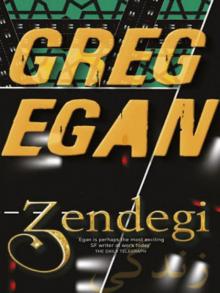 Zendegi
Zendegi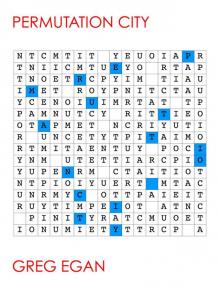 Permutation City
Permutation City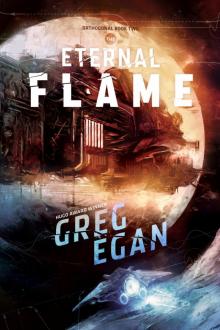 The Eternal Flame
The Eternal Flame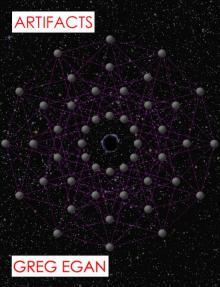 Artifacts
Artifacts Wang's Carpets
Wang's Carpets Dichronauts
Dichronauts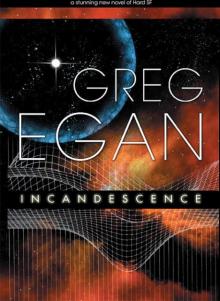 Incandescence
Incandescence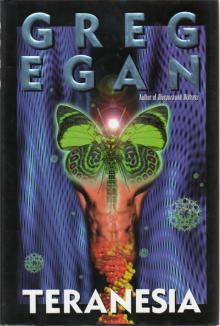 Teranesia
Teranesia Schild's Ladder
Schild's Ladder Quarantine
Quarantine The Four Thousand, the Eight Hundred
The Four Thousand, the Eight Hundred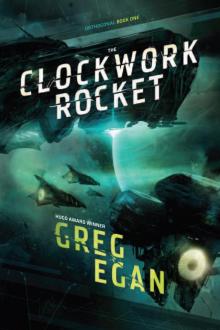 The Clockwork Rocket
The Clockwork Rocket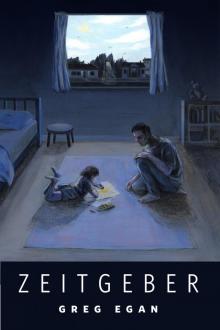 Zeitgeber
Zeitgeber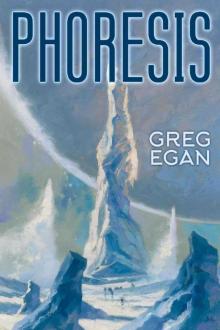 Phoresis
Phoresis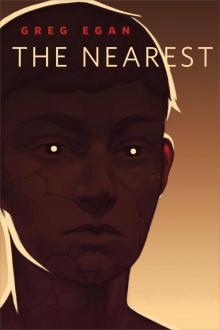 The Nearest
The Nearest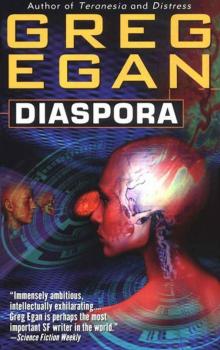 Diaspora
Diaspora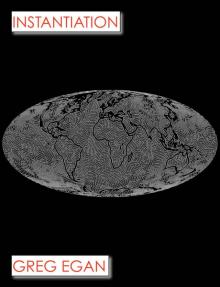 Instantiation
Instantiation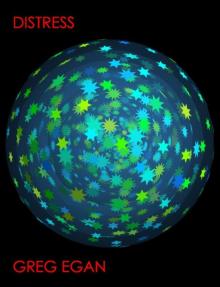 Distress
Distress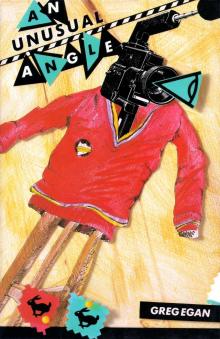 An Unusual Angle
An Unusual Angle Oceanic
Oceanic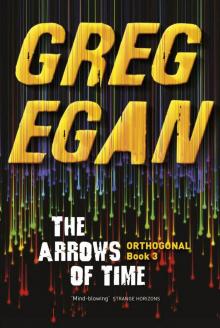 The Arrows of Time
The Arrows of Time Axiomatic
Axiomatic![Anthology 2. Luminous [1998, 2010] Read online](http://i1.bookreadfree.com/i/03/18/anthology_2_luminous_1998_2010_preview.jpg) Anthology 2. Luminous [1998, 2010]
Anthology 2. Luminous [1998, 2010]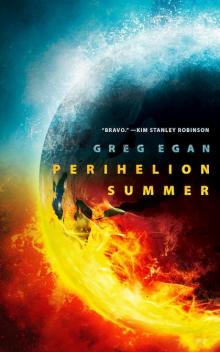 Perihelion Summer
Perihelion Summer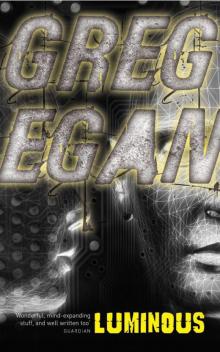 Luminous
Luminous